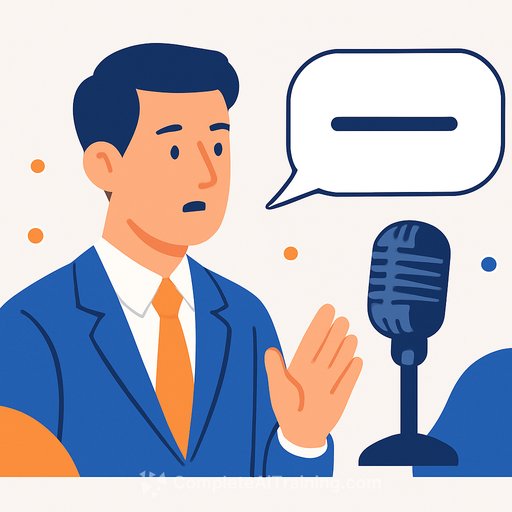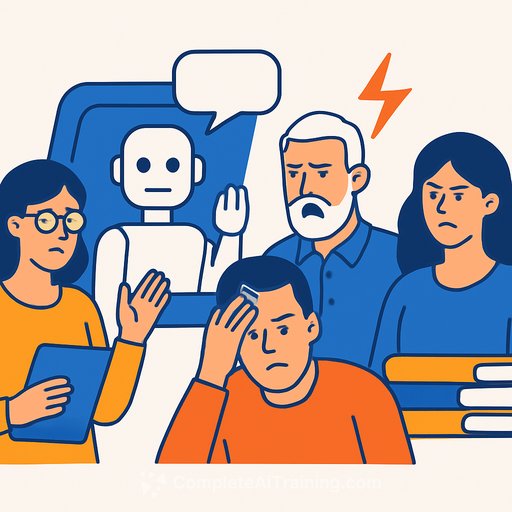How AI Is Destroying Life in Writing
Writers and educators are staring at the same problem: AI can produce text that looks fine at a glance and says nothing that matters. That surface-level polish is exactly why it scares me. It threatens the habits that give writing its pulse - honesty, timing, and the guts to leave a rough edge.
Recently, a nine-year-old's river essay crossed my desk. It had typos. It wandered. It jumped in time. And it had life. He opened with, "The water flies into my face." Later, he riffed, "I expected that the main attraction of the trip would be a little more… I don't know, main attraction-like." That's voice. That's a mind thinking on the page.
He even told a small, human truth: hearing his grandfather stuck on a rock, he writes that he "thinks" he heard him whisper, "Okay, you got this." That tiny hedge - I think - is artistic license in action. It's how real memory works. It's how good writing breathes.
Out of curiosity, I asked an AI to write a similar piece: "whitewater kayaking from the perspective of a nine-year-old boy." In seconds, it delivered sentences like, "Last summer, I went on the most awesome adventure of my life!" plus a spray of exclamation points, tidy paragraphs, and parents who never hiccup. Perfect grammar. Zero risk. No heartbeat.
Here's the danger. A lot of people would read that AI draft and say, "Looks good." A rushed teacher might even slap an A on it because it's clean, safe, and on-topic. That's how living language gets replaced by checkbox language.
Writing is a life skill because it is revision
Writing and editing mirror life: you make a mess, you make it better, you cut what doesn't serve, you sharpen what does. The growth sits in the rewrite, not the first pass. If AI shortcuts that grind, we lose the muscles that make original work possible.
Keep the life in your pages: practical guardrails
- Ban exclamation points for 30 days. If a sentence needs one, the sentence is weak. Replace excitement marks with precise detail. If you want a refresher on punctuation discipline, skim Purdue OWL's guide: Purdue OWL: Punctuation.
- Do a "truth pass." Second draft: circle every sentence that sounds like a template. Replace each with something you'd actually say to a friend who calls your bluff.
- Write one section out of order. Start with the moment that stings or surprises. Then backfill. Nonlinear beats predictable.
- Keep one scuff. A deliberate rough edge - a clipped sentence, a weird metaphor, a human aside - can be the fingerprint that keeps a piece from reading like a brochure.
- Show process, not just polish. Save notes, outlines, and two drafts. If you're in a classroom or team, share them. It trains attention on thinking, not just formatting.
If you use AI, set firm rules so it doesn't flatten your voice
- First draft is yours. Longhand, talk-to-text, or a blank doc - but no machine phrasing. Let AI react after you've put skin in the game.
- AI can question, not declare. Ask for critiques, gaps, and counterpoints. Ban it from writing your sentences.
- Use it for structure only. Outlines, checklists, fact checks, and references are fair game. The lines are yours to write.
- Create a "voice brief." Three sample paragraphs that sound like you, with do/don't rules. If you ever let AI touch a draft, make it conform to your brief - then rewrite anything that feels generic.
- Track substitutions. Any sentence AI suggests must be rewritten in your words before it survives the next draft.
If you want a practical primer on asking better questions of AI without handing it your voice, this roundup can help: Prompt Engineering Guides.
For educators: grade the thinking, require the trail
- Require artifacts. Notes, outline, messy draft, peer feedback, final. Make each stage count toward the grade.
- Ask for personal specificity. Require concrete elements that AI is bad at: time, place, sensory detail, contradictions, and a moment of changed mind.
- Assess voice and revision choices. "What did you cut and why?" is a better question than "Did you hit 800 words?"
Clean, safe, and forgettable is the default now. Your job is to keep the dents, the honesty, and the hard-won clarity. Guard that with your life - because the rewrite is where your real voice shows up.
If you're curious about tools without losing your edge, browse focused AI resources for writers here: AI Tools For Copywriting and here: ChatGPT Resources.
Your membership also unlocks:






